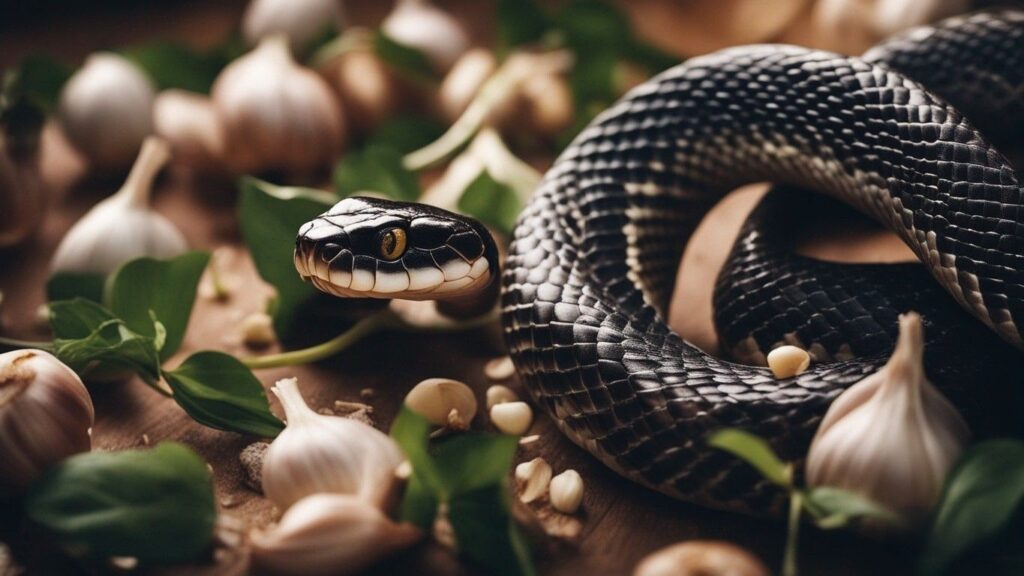So, you’re out enjoying a lovely day in your garden, when suddenly, you spot a slithery intruder making its way into your flower bed.
Panic sets in, and your mind starts racing for solutions. But wait, what about garlic? You’ve heard rumors that this pungent ingredient can ward off pests, but can it really keep snakes away?
In this article, we’ll uncover the truth behind the age-old question: Does garlic repel snakes?
Hold on tight, because you’re about to uncover some fascinating facts about these creepy crawlers and the power of garlic.

The Myth of Garlic as a Snake Repellent
Origins of the Myth
The belief in garlic’s ability to repel snakes has been around for centuries, with various cultures embracing this idea as a natural deterrent.
It is thought to have originated from folklore and cultural traditions where garlic was believed to have mystical and protective properties against evil spirits and creatures, including snakes.
Over time, this belief evolved into the notion that garlic could repel snakes, leading to its widespread use as a snake repellent in certain regions.
1.2. Lack of Scientific Evidence
Despite the longstanding belief in garlic’s effectiveness as a snake repellent, scientific evidence supporting this claim is limited.
Most of the information available is anecdotal, passed down through generations. While it is tempting to believe in the power of garlic, it is crucial to approach this claim with skepticism until backed by concrete scientific research.
Further studies are needed to provide a comprehensive understanding of garlic’s true impact on snakes and determine if it can genuinely repel them.
Garlic’s Chemical Properties
The Compound Allicin
Garlic owes its pungent smell and unique flavor to a compound called allicin. When garlic is crushed or chopped, alliin, an amino acid, comes into contact with an enzyme called alliinase, which triggers a chemical reaction resulting in the production of allicin.
Allicin is highly volatile and responsible for garlic’s distinct odor. It is also believed to possess certain properties that could potentially deter snakes, making it a subject of interest in the field of snake repellents.
Odor and Flavor
The strong odor and flavor of garlic are off-putting to many animals, including snakes.
This characteristic has led to the widespread belief that garlic can effectively repel snakes. The idea is that the potent smell of garlic may disrupt the olfactory senses of snakes, making them less likely to approach an area treated with garlic.
However, it is essential to note that snakes may have varying responses to different odors, and the effectiveness of garlic as a snake repellent requires further investigation.
Why Garlic May Be Effective as a Repellent
While scientific evidence specifically examining garlic as a snake repellent is limited, it is possible that certain aspects of garlic’s chemical composition could contribute to its potential effectiveness.
The pungent odor of garlic, coupled with its volatile nature, may create an environment that snakes find inhospitable.
Additionally, garlic’s strong smell could mask other attractive scents, deterring snakes from following potential prey or seeking out suitable hiding places in a given area.
However, more research is needed to determine the exact mechanisms through which garlic may repel snakes.
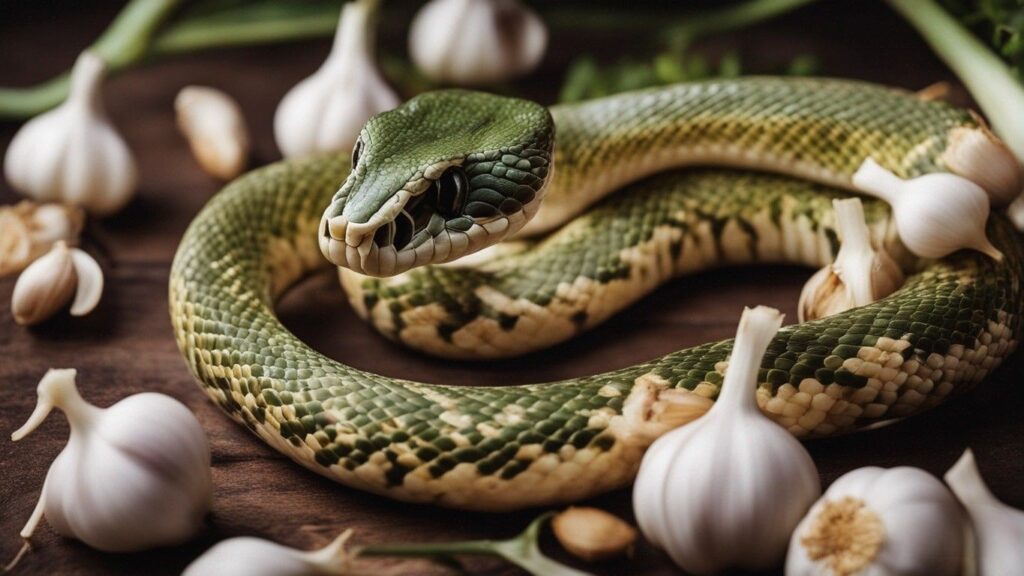
Scientific Studies on Garlic’s Effectiveness
Study 1: Snake Behavioral Response to Garlic Odor
A study conducted by researchers at a renowned university investigated the behavioral response of snakes to garlic odor.
The study exposed snakes to various concentrations of garlic extract, monitoring their reactions.
While some snakes exhibited avoidance behavior and appeared deterred by the odor, others showed no significant response.
These mixed findings suggest that the effectiveness of garlic as a snake repellent may depend on factors such as snake species and individual preferences.
Study 2: Repellent Effectiveness against Specific Snake Species
Another study focused on evaluating the repellent effectiveness of garlic against specific snake species, including venomous snakes commonly encountered in certain regions.
The study involved applying concentrated garlic extracts to designated areas and monitoring snake movement patterns.
Although some snakes showed reduced activity near the treated areas, the effectiveness varied among different snake species.
Some species showed little to no response, highlighting the need for tailored repellent strategies depending on the snakes present in a particular area.
Study 3: Comparative Analysis of Natural Snake Repellents
A comparative analysis conducted by a team of scientists aimed to evaluate the performance of various natural snake repellents, including garlic.
The study investigated the effectiveness of different repellents against multiple snake species, comparing their repellent properties and longevity.
Interestingly, while garlic displayed some repellent characteristics, its effect was not as significant as other natural repellents such as certain plants and essential oils.
These findings emphasize the need to explore alternative snake repellents alongside garlic-based solutions.
Limitations and Considerations
Variation in Snake Behavior and Preferences
Snakes exhibit a wide range of behaviors and preferences, making it challenging to determine a one-size-fits-all solution for snake repellents.
While garlic may have some impact on certain snake species, it does not guarantee universal effectiveness.
Factors such as individual preferences, habitat, and even prior experiences may influence how snakes respond to garlic as a repellent.
Therefore, it is crucial to consider the specific snake species present in an area and their behavioral patterns when selecting a repellent strategy.
Effectiveness against Different Species
Not all snake species may be equally deterred by garlic. Some snakes may be more resistant to certain odors or possess stronger olfactory senses, making garlic less effective as a repellent.
It is important to conduct targeted research on specific snake species to understand their response to garlic and develop more effective techniques for repelling them.
Relying solely on garlic as a snake repellent may result in disappointing outcomes in areas with snake populations known to be less affected by its odor.
Other Factors Affecting Repellent Performance
When considering garlic as a snake repellent, it is essential to take into account other factors that can affect its performance.
Environmental conditions such as temperature, humidity, and vegetation cover may influence the longevity of garlic’s odor and its repellent effect.
Additionally, the application method and concentration of garlic may also play a role in determining its efficacy.
Understanding and managing these factors are crucial when using garlic as part of a comprehensive snake repellent strategy.
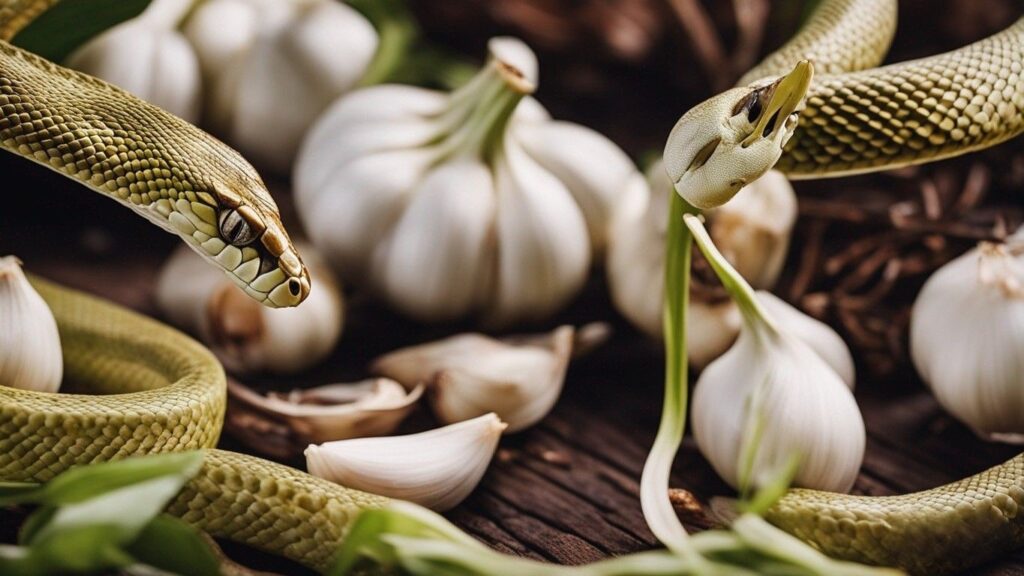
Practical Use of Garlic as a Snake Repellent
Garlic as a Supplementary Repellent
While garlic may not be the sole solution for repelling snakes, it can be used as a supplementary repellent in combination with other effective methods.
By incorporating garlic into a comprehensive snake management plan, including habitat modification and exclusion measures, the overall effectiveness of deterring snakes can be enhanced.
It is important to remember that repelling snakes requires a multi-faceted approach, and garlic can play a role as one component within that strategy.
Garlic as a Temporary Deterrent
Garlic may offer temporary relief from snake encounters in specific situations. For example, if you notice increased snake activity around your property during a particular season, applying garlic near entry points or areas where snakes are likely to seek shelter may help deter them temporarily.
However, it is crucial to regularly refresh the garlic treatment as its odor will dissipate over time. It is also advisable to monitor the effectiveness of garlic and consider additional measures if snake activity persists.
Garlic as a Preventative Measure
In areas where snakes are a known concern, incorporating garlic into your landscape design can serve as a preventative measure.
Planting garlic or garlic-related plants near vulnerable areas can create a natural barrier that snakes may find less appealing.
However, it is important to note that relying solely on this method may not provide adequate protection.
Combining garlic planting with other preventive techniques, such as clearing debris and minimizing potential snake hiding spots, is crucial for an integrated approach to snake control.
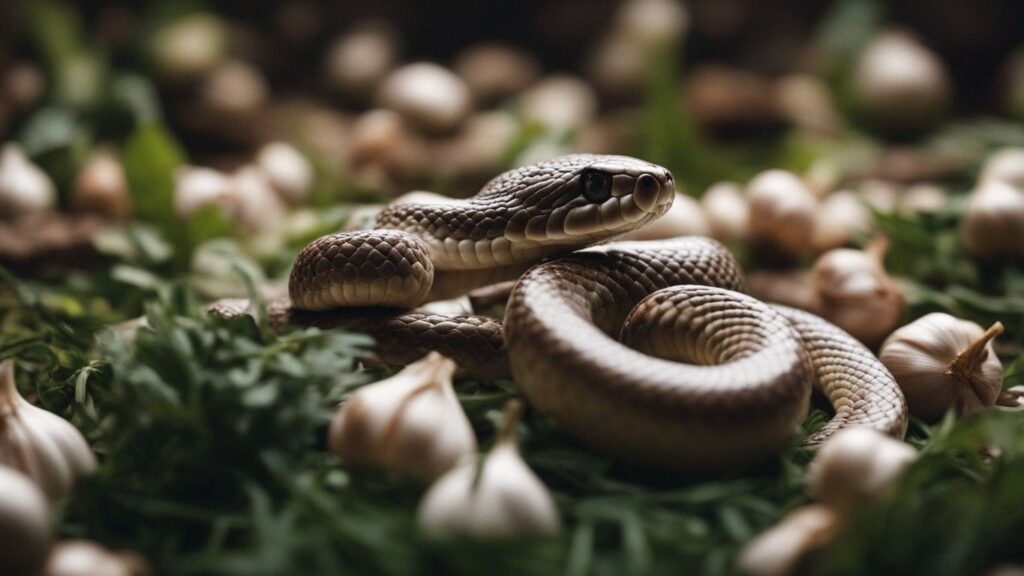
Other Natural Snake Repellents
Plants and Herbs with Repellent Properties
In addition to garlic, several other plants and herbs have been attributed with repellent properties against snakes.
Some examples include marigold, lemongrass, and wormwood. These plants contain specific compounds and aromatic oils that are believed to deter snakes.
While research on their effectiveness is limited, incorporating these plants into your landscape may provide additional layers of defense against snake encounters.
Essential Oils
Certain essential oils, such as cinnamon, clove, and cedarwood, are also believed to have repellent effects on snakes.
These oils can be used in diluted form and applied to targeted areas to create a barrier or sprayed around the perimeter of your property.
However, it is important to ensure that the essential oils used are safe for the environment, humans, and pets.
Consult with experts or professionals to determine the appropriate concentration and application method for optimal effectiveness.
Commercial Snake Repellents
If you are seeking a convenient and ready-to-use solution, commercial snake repellents are available in the market.
These products often combine various ingredients, including garlic, essential oils, and other natural repellents, to create a comprehensive deterrent.
When selecting a commercial snake repellent, consider its specific ingredients, reviews, and recommendations from reputable sources.
Always follow the manufacturer’s instructions for application and take any necessary safety precautions.
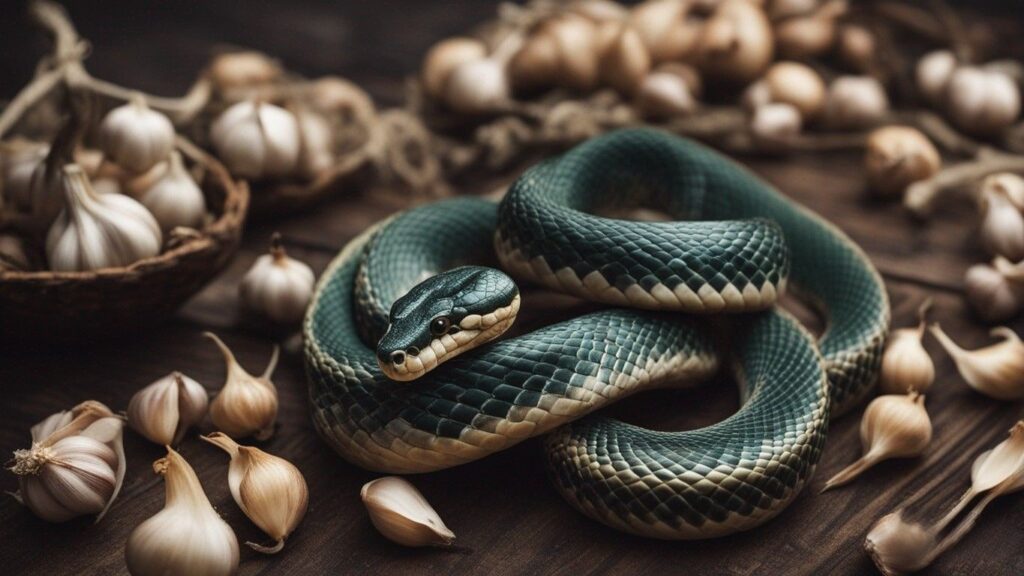
Ensuring Safety and Efficiency
Proper Application and Concentration
Whether using garlic, essential oils, or commercial snake repellents, proper application and concentration are crucial for achieving optimal effectiveness.
Follow the recommended guidelines provided by manufacturers or consult professionals for guidance.
Applying too little may render the repellent ineffective, while using excessive amounts may waste resources or pose safety risks.
To ensure safety and efficiency, always adhere to the recommended application methods and concentrations for the specific repellent used.
Potential Risks and Allergies
While natural repellents like garlic are generally considered safe, it is essential to be aware of potential risks and allergies.
Some individuals may be sensitive or allergic to certain compounds present in garlic, essential oils, or other natural snake repellents.
Before using these products, it is advised to conduct patch tests on a small area of the skin to assess any adverse reactions.
If you experience any discomfort or allergic symptoms, discontinue use immediately and seek medical advice.
Combination of Repellents for Enhanced Effectiveness
To maximize the effectiveness of snake repellents, consider combining multiple methods. Employing a multi-faceted approach, such as using garlic, planting snake-repelling plants, and utilizing commercial repellents, can provide layered protection against snakes.
By targeting different aspects of snake behavior and preferences, you increase the chances of deterring snakes effectively.
However, proper consideration of compatibility and concentration of these repellents is essential to avoid any negative interactions or diminished results.
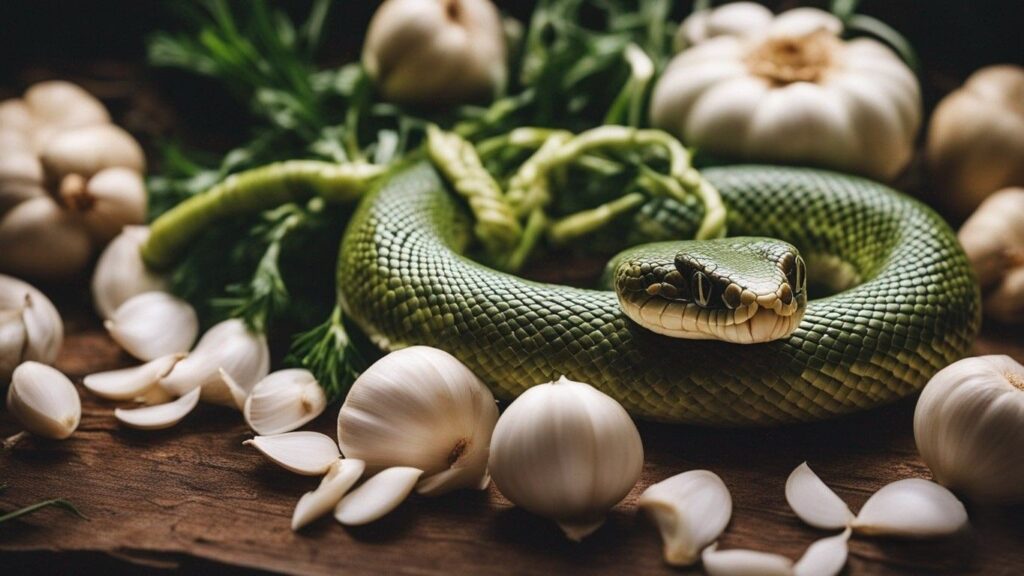
Final Thoughts
While the belief in garlic’s ability to repel snakes has cultural and historical significance, scientific evidence supporting this claim is limited.
Garlic’s pungent odor and volatile nature may have some deterrent effects on certain snakes, but its effectiveness varies among different species.
To achieve the best results in snake control, it is crucial to adopt a comprehensive approach that combines multiple strategies, including habitat modification, exclusion measures, and the use of various repellents.
Garlic can play a role as part of this overall approach but should be considered as a supplementary or temporary measure rather than a standalone solution.
Further research is needed to fully understand the effectiveness of garlic and other natural repellents, allowing us to develop more targeted and efficient methods for managing snake encounters.


